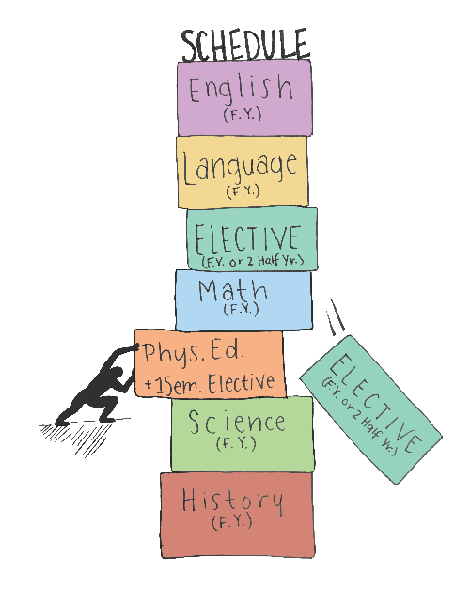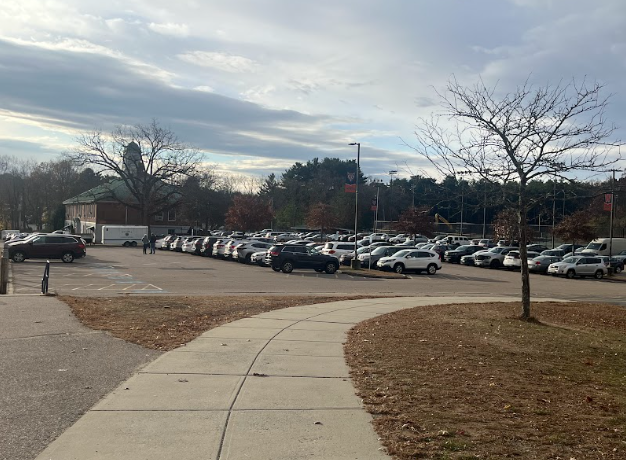By Andrea Traietti and Michaela Donato
Editor-in-Chief and Staff Writer
Walpole Public Schools administrators and School Committee members are currently working to change Walpole High’s curriculum and daily class schedule. Specifically, there is one major change surrounding the Physical Education curriculum: future WHS students will be required to take one semester-long (half school year) physical education course all four years of high school.
The change comes with Walpole High’s 2017 Coordinated Program Review (CPR), which occurs every six years.
The CPR provides a holistic evaluation of Massachusetts schools, examining and rating every component of the school environment and academics, and ensuring that the school is in compliance with federal and state laws. This year, administration has chosen to address one specific law that Walpole High School has violated for a number of years: Chapter 71, Section 3. This law, revised in 2000, states, “Physical education shall be taught as a required subject in all grades for all students in the public schools for the purpose of promoting the physical well-being of such students.”
Right now, the Walpole High School Student Handbook requires only one semester of physical education total in order for students to fulfill the graduation requirement. The school has held this standard for six years, thus violating the law since the start of the 2011-2012 school year. However, when the law was first enacted in 2000 Walpole was actually in compliance, requiring students to participate in four years of physical education. The Walpole High curriculum was in fact following the law in 2011, at the time of the last CPR. However, shortly after, the curriculum changed to its current status, requiring only one semester of physical education.
In order to amend this violation, Walpole High School will revert to the policy used prior to 2011 and will require all students, beginning with the Class of 2021, to take a one-semester physical education course every year of high school.
While this change does put Walpole High in check with the Massachusetts law, it threatens the crucial diversity of opportunities that Walpole High currently affords its students. Foreign language, art, business, technology and intense academic classes flourish with the current one-year, single semester physical education requirement, a minimal requirement that doesn’t limit schedule flexibility. Students can experiment with and concentrate on specialized courses that really interest them, and these courses can both provide a relief for students and expose them to interests they did not know they had.
If Walpole High enacts the new four-year requirement, students will not be able to pursue the classes that interest them because the one-semester gym course will limit the course options that fit in their schedules. Tough decisions between passions and requirements will arise for many students, and this curriculum shift will rob students of opportunities to learn about themselves and about plausible paths for their futures.
Frustrating as the scheduling process is now, it will grow increasingly more frustrating as guidance struggles to balance students’ academic needs with this gym requirement. In fact, is it even possible to fit 1,200 students into gym classes during the available seven periods each semester when there are only three physical education teachers?
Alongside these practical issues with the new requirements, the inelasticity of the current seven period schedule presents an even larger problem. In order to maintain students’ ability to take choice classes (not to improve students’ opportunities, just to maintain them), administration will need to reconfigure the schedule. The most obvious adjustment would be to shorten class duration and add another period so that students would not have to sacrifice any of their choice classes for physical education. In response to talk of an additional period, however, many teachers forcefully and swiftly reject the idea. The possibility of an additional period and the gym requirement also concerns students: for some, it will mean another class to prepare for and another semester class to take with gym.
The schedule modifications necessary to adequately adopt the four-year requirement are more than modifications; a complete overhaul of the current schedule is the only option. And when reconstruction of the schedule looms, the proposed curriculum change becomes an elaborate process involving the entire district—from negotiations with the teachers’ union to departmental restructuring to course catalog adjustments to reexamined start and end times to rescheduled bus routes to an entirely new budget. Integrating this proposed curriculum change is more than rewriting some sections of the handbook; this change will take years to enact and will burden teachers, students and administrators for just as long. Does rushed compliance with a law that both Walpole and the Department of Education have disregarded for the past six years actually warrant these irreversible intellectual impairments?
Even if administrators manage to draft a schedule that maintains current opportunities available to students, the timing and the mode of implementation of the new schedule will create even more problems.
For next year, administration plans to make all freshmen complete a one-semester physical education class without changing the schedule in any way. This new requirement without a schedule change may not have an immediate major impact on the student body, for roughly 90 percent of freshmen choose to take gym during their freshman year anyway. Thus, only about 15 percent of freshmen would have to amend their schedules to accommodate for the mandatory requirement.
Overall, students won’t face major issues next year. However, as soon as the class of 2021 becomes sophomores, a major schedule change will simply have to be enacted in order to give these students the opportunity to choose other elective courses. As previously mentioned, basically the only logical change is to shorten class times and add another period. This idea seems well and good until it’s not. In the end, the schedule change will not be the panacea to all of the problems created by the implementation of the gym requirement.
If implemented in the 2018-2019 school year, as currently planned, the change will help freshmen and sophomores, the beginning waves of classes required to take PE. However, juniors and seniors—the classes of 2019 and 2020—will not have the same gym requirement, since administrators are planning to wave in the new requirement with each class rather than all at once.
Are juniors and seniors really going to be expected to suddenly be able to pick up a new class or possibly several new classes more than halfway through their high school careers?
Administration must consider the consequences of the physical education requirement and subsequent schedule change. These amendments won’t just put Walpole High back on track with state laws; at the same time, they will seriously alter the quality of the education that Walpole High has to offer, the opportunities that students will have to grow into well-rounded and independent thinkers, and the overall identity of our school and student body. These outcomes should not be taken lightly.
In terms of immediate course of action, administration needs to be upfront and clear about the developments in curriculum and schedule changes, not only with incoming freshmen, but with the older grades who will face different consequences with the schedule change. Before any requirement is made, a definite and appropriate plan must be secured for future students. Before administration changes the physical education requirement, they need to have a definite replacement schedule—even if the new schedule will not be implemented at the same time as the physical education requirement is implemented. And most importantly, students should have a say in the changes that will affect not only their own educations, but the educations of Walpole students for years to come.














